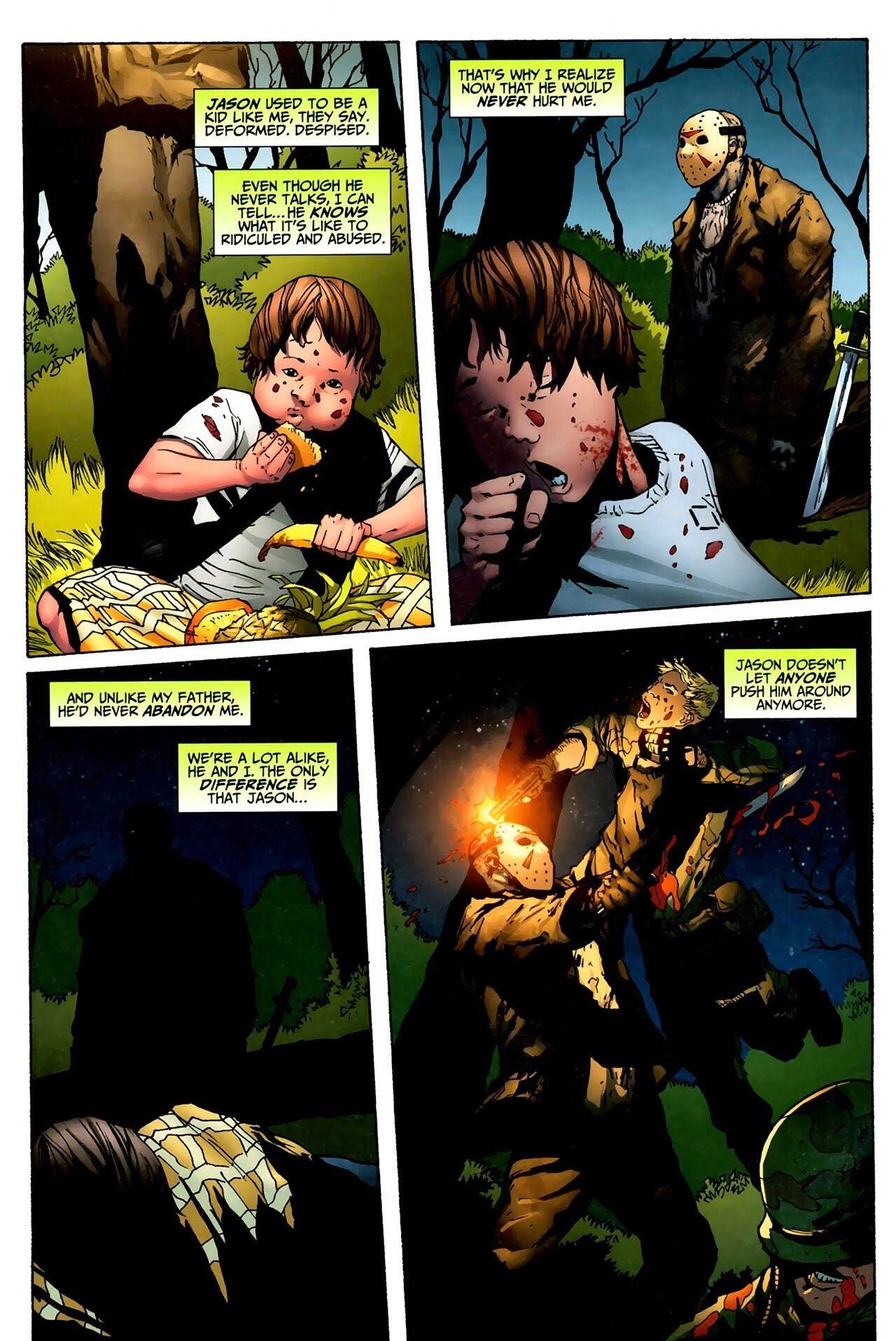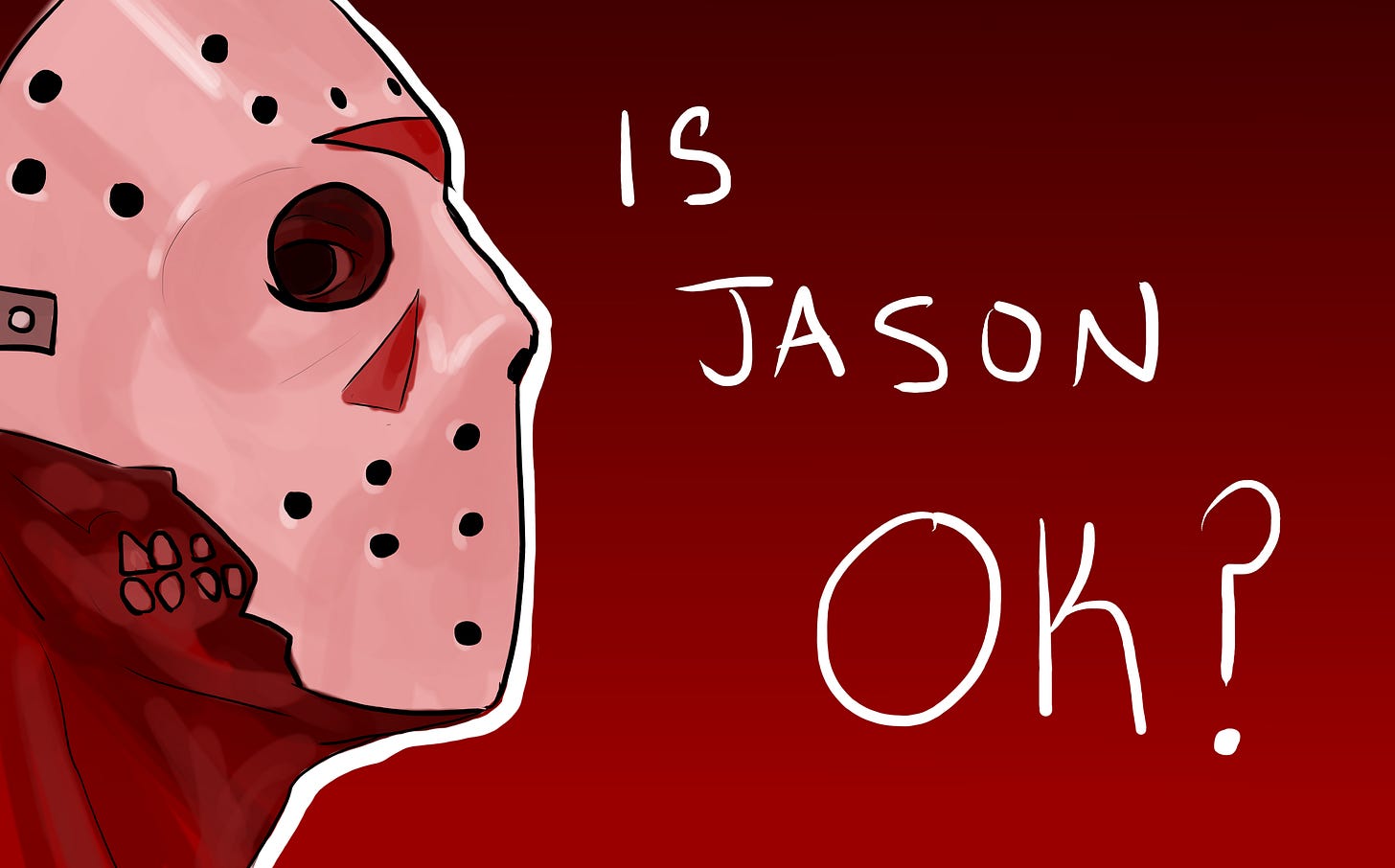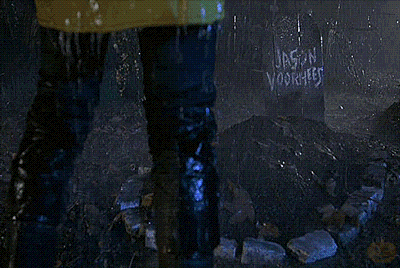Friday the 13th is Depressing, Actually
Generational trauma, bullying, and Jason's hidden sympathies
Jason Voorhees is one of the most recognized characters in cinema. That’s not even a stretch — he’s up there with Superman and Spider-Man in terms of immediate recognizability, possibly in part thanks to his iconic hockey mask.
Like his brother-in-crime over in Haddonfield, Jason Voorhees is a silent killer, stalking his victims without a single peep as he slashes through their flesh. But Jason is a little different in comparison to his slasher friends.
Sure, overanalyzing most of the iconic slashers’ origins could lead anyone to the conclusion that their stories are actually pretty damn sad. Michael killed his sister at six-years-old, Leatherface was raised by literal incestous cannibals, and Jason… well, Jason is probably one of the most upsetting.
And Freddy doesn’t matter. Dude was a villain even before he became the dream master. He deserved to get boiled alive, man.
Jason, however, always gave me the impression of being from the same vein as Carrie White. They’re certainly villains, but at the same time I can’t help but feel bad for them in knowing their backstory. And, just like Carrie, Jason was also a victim of a life he had no real control over.
Jason was born on June 13th, 1946. From the films, it was already obvious that he had a tough childhood. After all, he was a kid with a deformity, and children are sometimes cruel to things they don’t understand.
Jason was destined to have a rough time even before he was born, as Pamela’s husband was abusive to her while she was pregnant. An abuse that Pamela would bring to an end when she ultimately murdered him, done so after her unborn son “told” her to do it.

It was obvious that Pamela struggled with her mental health in the original Friday the 13th (1980), but audiences could water this down to a grieving mother, unable to forgive the sins of the past. She was mad with sorrow, mourning the son she lost to the negligence of camp counselors.
But Pamela suffered from more than just grief. She had serious problems before Jason ever passed away, which was made apparent by the murder of her husband. She needed help, but it was a different time back then, and mental health was more so seen as a myth than something that actually existed.
You know the drill. Back then, depression didn’t exist. You just felt a little sad. Who needs a therapist when you have a tall glass of fresh water to chug? Yeah, crazy times.
Even so, Jason was Pamela’s world. He was the one thing that stayed constant in her life, the child that held unconditional love for her no matter what. When he left, everything shattered for her; her world, her heart, and what was left of her mind.
We all know what happened to Pamela.
It’s important to remember that Jason drowned because the camp counselors quite honestly didn’t give a damn. They were selfish, and they certainly weren’t concerned about the safety of the children. Moreso, they didn’t care what happened to the child with a deformity.
Jason was different, and different was bad. People didn’t—and some still don’t—care about anybody who is different. Being different than everyone is a sin. That darn society, you know, forcing pressures onto people to think that they have to be a certain way to fit in. Too bad Jason couldn’t “fix” what was “wrong” with him. But that was the thing, wasn’t it?
He didn’t have to fix anything. He shouldn’t have been bullied for something he couldn’t control. He was different, sure, but that doesn’t mean he needed to be treated any different.
Freddy vs. Jason (2003) alluded to the bullying of Camp Crystal Lake far more than any other film had. There was the specific nightmare scene showcasing the other children bullying him, forcing him into the lake and causing his eventual demise.
As much as we tend to forget it, Friday the 13th is arguably a cautionary tale about the effects of bullying. It wasn’t necessarily meant to be that, but you can analyze the hell out of anything. While Carrie is more obvious in its messaging, Friday the 13th is something you have to dig for.
That’s not me trying to pretend it’s a masterpiece of a franchise. Let’s not forget that this is an 80s slasher filled with kooky kills and corn syrup blood. But again, that doesn’t mean we can’t overanalyze it.
After all, Jason became a serial killer. He was bullied and abused, forgotten about and left to rot. Yet his murdering wasn’t out of spite of his own trauma… it was revenge for his dead mother. Jason doesn’t kill out of joy or because it gives him an adrenaline rush, he kills because he feels he has to.
Similar to how “Jason” told Pamela to kill her husband, Pamela tells Jason to kill anyone who dares to trespass on Camp Crystal Lake. She’s permanently in his head, with the demands of unjustified murder echoing in his skull.
Jason is a mama’s boy. He wants to please his mother. I don’t think he really cares about the fact that he was wronged. Jason only cares that Pamela was wronged.
We could argue that even in death, Jason continues to be a victim of manipulation. Similarly to Norman Bates, it’s the mother that’s the true mastermind of it all.
Still, Jason chooses to kill. He doesn’t have to kill any of those teenagers, but he chooses to do it for his mother. That’s not to say that the trauma he endured as a child doesn’t still haunt him in other ways, though.
The comics offer an interesting look into Jason’s character. Believe it or not, there’s a lot more to the guy than just empty stares and silence.
In the comic Friday the 13th: How I Spent My Summer Vacation, Davie Falkner attends Camp Crystal Lake. Like Jason, he suffers from a birth deformity which causes the children to endlessly bully him. They taunt him with the story of Jason, even throwing him in the lake as a way to screw with the kid.
Jason kills everybody. In fact, he was quick to kill Davie too—except he didn’t.
Davie is like Jason, and Jason is smart enough to recognize this. The deformity, the bullying, even being thrown into the lake. He can’t bring himself to kill the boy, and later even saves the child from being shot.
In fact, Jason takes care of Davie for over a week. Davie grows to have a special bond with Jason, feeling as if the people that Jason kills deserve what they get.

It’s a fascinating tale, showing a side of the killer that we typically are never allowed to see in film. Sure, the “sensitive” side to Jason has been shown in regards to his mother, and even more so in Freddy vs. Jason, but the concept of Jason attempting to care for a child has never been attempted before.
And why would it? Nobody thinks of Jason as a sympathetic character, they think of him as a silent duntz with a machete. But Jason has grown to be something much more than that.
This hint of a sympathetic nature has been there, though, just not as obvious. Kane Hodder argued that Jason refuses to murder children and animals because he deems them as “innocent.” In the films, this is mostly true. Jason typically steers clear of murdering children, and goes for the batty teenagers instead. Although the comics of this franchise sometimes go against this moral code, I like to pretend the comics just… simply forget about it.
Jason’s moral code makes him much more unique in comparison to his fellow villains. It’s a personality trait that you have to dig for, and finding it under that pile of rubble makes it that much better.
He’s a product of the cruelty he experienced. A murderer that refuses to kill those he can see himself in.
There’s a few sympathetic villains in horror. Carrie White, Norman Bates, Hell, some people would probably even argue Pearl. But Jason Voorhees should be included on that list too. His story is nothing but cruelty, a child losing his life because nobody cared enough to keep him alive.
Nobody wants these villains to be seen as little angels (God knows they’re not), but understanding what caused them to snap is a great lesson for anybody to learn. Trauma, mental health, bullying, dysfunctional families. These characters are written with these backstories for a reason, and we’re supposed to take notice of the message.
Looking at slashers in a more critical way allows us to find something pass the surface, chipping away at the ice to get to the lake underneath. While I can admit Friday the 13th is just a silly 80s flick, I can also admit that there’s a lot more to Jason than hockey masks and machetes.
There’s a story at the bottom of the lake, you just have to fish it out.







Great essay!